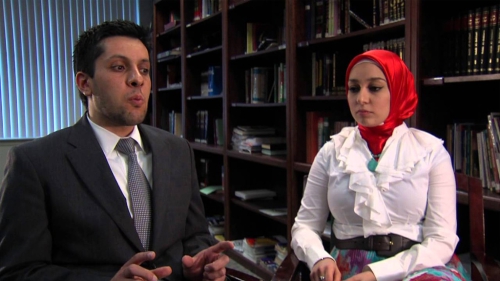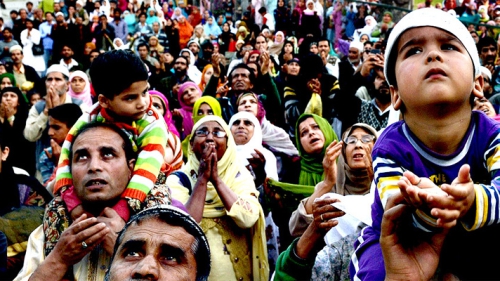The Quranic Concept of Divorce

When a man and a woman marry each other, it is their utmost wish to remain in this relation of wedlock forever. They are desirous of the fact that the change in times not change their commitment to each other and only death separate them in this world. But then, sometimes there does arise a situation when part they must. Differences become so pronounced that it becomes necessary to sever this relationship. If such circumstances do befall that a husband and wife must separate permanently, Islam lays down a specific procedure for this separation. In Islamic terminology this dissolution of marriage is called Talaq (divorce). It says that both a man and a woman have an equal right to it. The only difference is that a man divorces a woman while a woman demands a divorce from her husband. In the following paragraphs, we shall attempt to explain the Qur'anic concept of divorce.
If a husband has decided to divorce his wife, he should first wait until she has completed her menstrual cycle and then desisting from any further carnal relationship, he should utter the divorce sentence just once. The wife, after she has been divorced in this way, must stay in her husband's house for a period of three menstrual cycles. This period is called Iddat. If a woman does not have menstrual cycles owing to age, disease or any other reason, and still there is a chance of pregnancy, then she must wait for three months. For a pregnant woman this period is up to the birth of the child, while for a newly married couple who have had no contact, divorce does not entail any period of Iddat for the wife. According to the Qur'an, there are two basic reasons for this waiting period: i) to ascertain whether a wife is pregnant or not so that the lineage of the child does not remain a matter of doubt, and ii) to give the husband and other family members a chance to rectify the situation, for matters in which emotions and feelings run high, sometimes only time is needed for recovery.
During this Iddat period:
(a) The husband cannot turn his wife out from the house except if she is guilty of adultery, nor should she leave the house herself.
(b) The wife, if she is pregnant, must not hide her pregnancy.
(c) The husband should continue to provide for her.
(d) A husband, if he changes his mind, can revoke his decision. The only thing required, according to the Qur'an, is that he should call in two persons to testify to his decision1.
If after this period of Iddat, a man is still firm in his stance, his wife shall be considered as separated permanently. She is now a free woman and if she wishes to marry some other person, she has all the right to do so and must not be inhibited in any way. If circumstances change, she can even remarry her former husband. Furthermore, the Qur'an stresses that on this occasion of parting it is not at all lawful for a husband to take back any property or asset gifted to her(2). This, it must be kept in consideration, does not pertain to mehr (dower) only, but to every type of gift given to the wife. Not only should a husband not take back these gifts, he should, in fact, give her something on this occasion of separation. Even if her mehr has not been fixed, it is better for him to give her something. If the mehr has been fixed but the divorce occurs before the husband and wife have had contact, he must return half the money, unless the wife even forgoes this. In this case also, though it is better that he should give her the whole money.
However, in case the husband revokes his decision during the Iddat period, there is no need for re-marriage. The two shall be considered as husband and wife once again. If after annulment of this divorce, due to some reason, the untoward situation arises a second time that the husband intends to divorce his wife, the Qur'an says that the husband can exercise his right of divorce for the second time as well. He should pronounce just one talaaq sentence to repudiate his wife. Again, the post-divorce period shall be observed in the manner just described. Once again, if the husband wishes, he has the chance to revise his decision during this period, in which case the divorce shall be considered null and void and the two shall once again become husband and wife. If, unfortunately, for the third time, the situation arises that divorce becomes inevitable, the Qur'an says that a husband can exercise his right for the third time as well and pronounce the divorce sentence. However, this time the wife she shall be permanently separated from him. After divorcing his wife for the third time, he cannot re-marry her now, unless and until, the wife marries some other person and owing to some reason gets divorced from him -- not under a planned strategy, but on account of naturally arisen circumstances. This last measure, actually, is meant to prevent this affair from becoming mere childplay.
In the words of the Qur'an:
This divorce [in which the husband can revoke his decision in the Iddat period] is permitted twice only. (2:229)
It is evident from these details that the Qur'an only prescribes one divorce sentence and stresses that a husband has the right to divorce her wife three times in his life. It does not at all approve the utterance of three divorce sentences in one go. Consequently, it is clear from these details that the two prevailing procedures of talaq ie (1) pronouncing three consecutive talaq sentences in one instance, and (2) pronouncing each of the three sentences in three months are not at all prescribed by the Qur'an. When the Prophet (sws) came to know that a certain person had divorced his wife by pronouncing three divorce sentences one after the other, he stood up in anger and said:
In my presence, such playful attitude has been adopted with the Book of Allah. (Nisai, Kitab-ut-Talaq)
A woman, as mentioned earlier, has an equal right to divorce. The only difference is that in such a situation she will demand a divorce from her husband. If the husband refuses, she has all the right to take the matter to the court. The matter will then be decided by the ruling of the court. A common misconception in this regard is that she must give some wealth to her husband on this occasion of separation. This, we are afraid, has no basis in the Qur'an; on the contrary, the Qur'an says that it is not at all permissible for the husband to demand anything from his wife on this occasion. However, if a husband has gifted a lot of wealth and property to her wife and is afraid that in divorcing her he would lose all his riches, the Qur'an says that she can forgo some or all of her share and return it to her husband to end the whole affair. It is clear that this is only an exception and not a general principle as is generally held and practiced. It is allowed when only wealth is the husband's reason for not divorcing his wife.
This is the shariah as far as the concept of divorce is concerned. However, as does happen with prescribed laws and procedures, situations arise in which a person is guilty of breaching the law and deviating from the right course. Human nature is prone to extreme emotional conditions in which it deviates from the path set forth by the Almighty. These deviations, it is extremely evident, are not part of the shariah; they fall into breach of law category and it is up to the legislature of a country to enact laws about such departures. At times, such cases are even left to the discretion of the judge and at other times the judge himself is bound by the legislation done in this regard by the parliament.
In case of divorce, keeping in view various precedents, this deviation is generally of two types:
i) A husband divorces his wife during her menstrual period, or divorces her after he has had contact with her in her period of purity.
ii) A husband divorces his wife by pronouncing the divorce sentence thrice.
As far as the first deviation is concerned, an Islamic government can ask the husband to revoke his decision and carry it out in the proper manner at the proper time. The Prophet (sws) in his own times dealt with the case of Abdullah bin Umar (rta) in a similar manner.
In case of the second deviation, a deliberation on the injunctions of divorce, particularly on their linguistic aspects, reveals that there are three possible solutions:
(a) The husband can be called to court and asked to testify to the nature of these pronouncements: if he testifies that he had pronounced the three sentences in anger to only strongly assert his decision or that he had thought that pronouncing three sentences was the correct procedure of divorce, the court, if satisfied by his statement, can re-unite the husband and wife. In this case, it shall be clearly spelt out to the husband that he now has exercised one of his three chances to repudiate his wife. If on the other hand, a person testifies that he had consciously uttered the three sentences knowing that he was exercising his three rights in one time, the wife, of course, shall be divorced from him. The case of Rukaana Bin Abdi Yazeed (rta) was decided in a similar manner by the Prophet (sws).
(b) A second possible solution in this regard is that a state, while observing that people have adopted a carefree attitude in following this procedure, legislates that three divorce sentences shall be considered as three whether pronounced in anger or in a normal emotional state. A precedent of this solution can be found in the times of the Caliph 'Umar (rta). He himself, in the capacity of a ruler in consultation with the members of the shura, upon seeing that people had adopted a very careless attitude in this regard, as a punishment, promulgated three divorce sentences as final.
(c) A third possible solution in this regard is that the state while observing the fact that people are mostly ignorant of the correct procedure and in their ignorance think that the correct way of divorce is to pronounce the sentence three times, legislates that the three pronouncements shall be considered as one.
Any of these three ways can be adopted keeping in view the welfare of the Muslims. However, in adopting the second or third solutions, it is necessary that a legislation has been done in their favour, but as far as adopting the first solution is concerned, no prior legislation is needed and the matter can be left to the discretion of the judge.
After explaining the Qur'anic concept of divorce and various aspects of legislation in case of any deviation from it, an important issue which must be elaborated upon before we end this article is the fate of the children after divorce. In this regard, it should remain clear that this is basically a matter which has been left to the discretion of the court. The basic consideration in this matter is the welfare of the children. The court can decide in favour of the father or mother, depending upon who among them is more beneficial to the children.
1. This testimony, as is evident from the Qur'an, is not a legal requirement. It is only a sound piece of advice for the welfare of the spouses.
2. The only exception to this rule is when the wife is guilty of committing adultery, in which case a husband can take back all the wealth and property gifted to her.
Related Suggestions
thanks.
I would appreciate if you post the reply to reader's questions online. Many of us may want to know the answers to the two questions asked about divorce.
Jazakumullah khair.
R. A. Samad
Jazak Allah for your article on divorce. It is a very complicated matter and I'm just trying to understand it. Recently a friend of mine got divorced from her husband. They are muslims but not very practicing. I have a question which I would appreciate if you could answer it.
They have been divorved now for more than 3 months - the iddah period - can they still get back together? This was their first divorce. If they can get back together, do they have to do a nikkh again? Please clarify this point. Jazak Allah.










